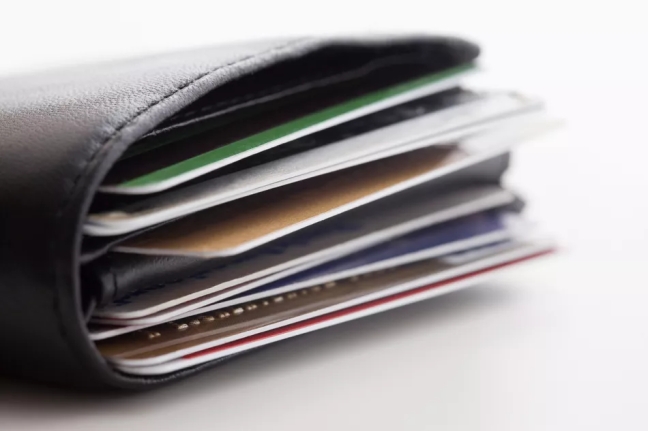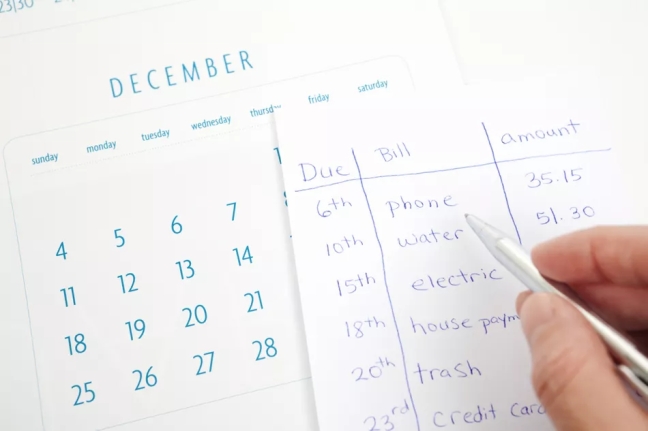1. Determine What You Owe
As the head of the household, it’s up to you to make sure that your entire family’s needs are being met. In order to do that, you need to be extremely diligent when it comes to money management basics. This is not something that will happen by accident. Instead, you must plan for it and work toward it.
The first step is to set up your “office.” Gather all of your bills, a calculator, a pencil, and your checkbook.
I would also recommend that you grab an old binder that you can use to keep track of your financial data and a shoebox for storing paid bills.
Now you’re ready to begin:
- Go through all of your bills, and pay anything that is due within the next week.
- If you have bills coming due that you cannot pay, notify the company and ask them to set up a payment plan with you.
- Print a copy of the chart “Paying Down My Debts” or make your own.
- On the chart, list all of your debts, including any car loans, student loans, and credit card debt.
- In addition, list the total balance left to be paid on all of these debts, and the percentage rate you are paying.
- For now, leave the fourth column of the chart blank, and store it in your “Financial Data” binder.

2. Eliminate Joint Debt
Before we create a plan for paying down your debt, it’s important to consider some special circumstances that may apply to you as a single parent. I asked LaToya Irby, Credit/Debt Management Expert, to share her expertise on handling joint debt:
Wolf: Let’s say a single mom still shares a credit card with her ex. What should she do?
Irby: Ideally, she would want her ex to transfer his portion of any joint balances onto his own credit card. That way, everyone is paying for their own debt.
Wolf: What about leaving both names on the account, and agreeing to pay part of the amount due? Is that ever advisable?
Irby: No. If you’ve made an agreement with your ex to split the debt payments on accounts that include your name, and your ex-misses a payment, it’s going to hurt your credit. If the ex-fails to pay altogether, the creditors and collectors will come after you. Not even a divorce decree can change the terms of a joint credit card agreement. In the credit card issuer’s eyes, you’re just as much responsible for post-divorce accounts as before.
Wolf: What about situations when a couple’s divorce decree mandates that one individual must pay off the joint credit card debt, but that person fails to do it?
Irby: You can always file contempt of court papers against him/her, but in the meantime, your credit score suffers. So I suggest paying off the debt to save your credit. If you can’t afford to pay the debt, at least make minimum payments to keep a positive payment history on your credit report.
Wolf: What about other accounts, such as utilities and cell phones?
Irby: The safest thing to do, if you have a service in your ex’s name, is to turn off the account and reestablish service in your name.

3. Find Money to Pay Down Debt
Another thing we have to do before creating a plan to pay down your existing debt is to find money in your budget each month. To assist in this step, I contacted Erin Huffstetler, Frugal Living Expert.
Wolf: How much money do you think the average person can uncover just by being more intentional about spending and budgeting?
Huffstetler: The average person could easily uncover an extra $250 a month—and probably much more.
Wolf: What are the top 5 areas that you think people should look to first when they’re trying to cut their expenses?
Huffstetler:
- Food spending (both groceries and eating out)
- TV-related expenses (cable/satellite services, certainly; but also movie subscriptions and rentals)
- Phone services (particularly extras like call waiting, caller id, long distance, and cell phones)
- Insurance premiums
- Miscellaneous spending (all those small amounts spent on coffee, vending machine snacks, and other indulgences)
Wolf: How can single parents, specifically, stretch their child support dollars and reduce child-related expenses?
Huffstetler: For single parents looking to stretch their child support dollars, creativity is the key. Look to children’s consignment shops and thrift stores to buy your kids’ clothes instead of department stores; sign them up for Parks and Rec-run activities instead of privately-run activities (which will always cost more); and don’t feel like you have to make up for being a single parent by buying them extra things—it’s you they need, not stuff.

4. Pay Off Your Debt
The next step is creating a schedule for paying down your debt:
- Pay off the debts that charge you the highest interest first.Bob Hammond, author of Life Without Debt, recommends that you pay off the debts that are charging you the highest interest first since borrowing from those creditors is costing you the most money. “Concentrate on paying off the high-cost debts as soon as possible,” Hammond advises. LaToya Irby, Credit/Debt Management Expert, agrees. “Highest interest rate debts cost the most money, especially when those debts have high balances. So you’ll save money on interest charges when you pay off those high-interest rate debts first.”However, there are exceptions to this general rule. Irby notes, “If you’re likely to get discouraged because it’s taking a long time to pay off that high-interest rate debt, you can start with the lowest balance debt. Getting some small debts paid off will motivate you to keep going.”
- Pay more than the minimum payment. Aim for paying more than the suggested minimum payment, in order to pay off your debts as quickly as possible.Miriam Caldwell, Money in Your 20’s Expert, shares this advice:
- Choose one debt to focus on.
- Increase your payment on that debt by as much as you can.
- Once you have paid off that debt, move all that you are paying on it to the next debt you want to pay off.
- You’ll be surprised at how quickly you can get out of debt with this plan!
- Meanwhile, continue to pay the minimum balance due on all of your other debts.Record what you intend to pay toward each debt on the debt chart you made in Step 1.

5. Budget Your Monthly Expenses
Now that you know where you stand financially, and you’ve created a plan for paying down your debts, it’s time to make sure that you’re making any other necessary adjustments so that you can keep up with your plan. And this means creating a budget.
I know this can be intimidating, but I’m going to make a suggestion for you: Sign up for Mint.com. It’s a free financial software program available on the Internet, and it will basically do your budgeting for you. It will create a visual pie chart showing how much you’re spending each month on housing, gas, food, entertainment, and more. This way, if it turns out that you’re spending a lot more on food than you really should, you can begin to make the necessary adjustments to get your spending under control.
If you would prefer to create your budget the traditional way, allotting a certain amount of money to each spending category, I’ve created an online budget calculator you can use, which includes categories for child support and other details specific to your life as a single parent.
Finally, in taking a look at where your money really goes each month, it’s important to know approximately how much money you “should” be spending in each category. Generally speaking, your net spendable income (after taxes) should be allocated as follows*:
- Housing: 30%
- Food: 12%
- Auto: 14%
- Insurance: 5%
- Debt: 5%
- Entertainment: 7%
- Clothing: 6%
- Savings: 5%
- Medical/Dental: 4%
- Miscellaneous: 7%
- Child Care: 5%
- Investments: 5%

6. Set Financial Goals
Now that you’ve worked out a plan to pay down your debt, and you’ve created a budget, it’s time to determine your needs moving forward.
Specifically, as a single parent, you need to ask yourself some questions, such as:
- Do you need to file for child support?
- Do you need to get a higher-paying job?
- Is it time to think about going back to school?
- Do you need to consider moving into a home/rental that would reduce your overall monthly payments?
- Are there alternatives, such as taking on another job or splitting expenses with another single parent family, that you need to consider at this point?
One of the things that I want you to know is that the ball is in your court. You determine where this goes from here on out. But unfortunately, you can’t do that if you’re ignoring your financial health, right?
So the fact that you’ve come this far in the process of getting a handle on your finances tells me that you’re determined to make the changes you need to make in order to provide for your family’s future.
So go ahead and ask yourself these questions. So much of single parenting is learning to roll with the punches and be creative in the face of adversity. If, indeed, you need to make some pretty major changes, now is the time to do it. Don’t incur any more debt where you are. Be resourceful, follow through, and do what you need to do to turn your financial situation around.

7. Increase Your Net Worth
The next step is to determine your net worth and begin adding to it.
Determine Your Net Worth:
Your net worth is what you own minus what you owe. Programs such as Mint.com, Quicken, and Microsoft Money will calculate your net worth for you, automatically.
You can also determine your net worth simply by adding up all that you own, including all of your investments, the equity you may have paid into your home, the value of your car, and any other assets you possess; and subtracting what you owe in remaining debts.
Set Up a Savings Account:
Once you know where you stand, you’ll be ready to set up a savings account. You can do this through your regular bank, or begin investing in a mutual fund that pays interest.
Even if you can only afford to set aside $25 or $50 per month, it will begin to add up.
Before you know it, you’ll have an emergency savings plan in place, to protect you in the event that your car breaks down, or your home needs a major repair.
In addition, this regular savings will help you increase your net worth over time.

8. Become Even More Frugal
Unfortunately, all of the work you’ve already done in steps 1-7 will have little lasting value if you don’t change your attitude toward money. Now is the time to become even more frugal and learn to live within your means.
Practice Discipline:
Stop imagining that more money is going to pour in tomorrow—through finally collecting on unpaid child support, winning the lottery, or getting a promotion. If those things happen, great! You’ll be even better off. But living as if they’re going to happen is causing you to spend money you don’t have.
Instead, force yourself to make purchases with cash only. Do not continue to pay outrageous interest payments toward credit cards for purchases you don’t absolutely need. You can get by without that new furniture, right? What else could you skip, in the interest of spending only what you have right now in the bank?
Try These Ideas:
- Check Freecycle before you make another major purchase. Someone else may be giving away the very thing you’d like to buy!
- When you’re getting ready to buy something specific, look for it on eBay first. I buy a lot of my clothes, new-with-tags, through online auctions!
- Forget trying to keep up with “The Jones’s.” You already know your value; don’t get caught up trying to “prove” your worth to others by having “just the right” house, car, or appearance.
- Do not use shopping, ever, to appease your emotions.
- Finally, when you do go to make a big purchase, step back and give yourself a few days–or even a week–to think about it. There’s no reason to suffer through buyer’s remorse and try to justify to yourself purchases that you really can’t afford. Think it over carefully and make those purchases, when necessary, with cash.

9. Schedule Your Own Weekly Financial Check-In
Grab your calendar and schedule a weekly financial update meeting with yourself. This is an extremely important step in managing your personal finances, and it’s one that you need to continue each and every week. During your “meeting” time:
- Pay any bills that are due.
- If your bank statement has arrived, take the time to balance your checkbook.
- Check the balances of your checking and savings accounts.
- Update your debt list to incorporate any recent payments.
- This is also a good time to write out your grocery shopping list and check what’s on sale at your local grocery store this week (either using the store’s Web site or the sales circular that comes in the newspaper).
- Finally, also make note of any upcoming expenses you need to anticipate and plan for.
An attitude of gratitude and finances.
References:
Irby, LaToya. Email interview. 24 Oct. 2008, Huffstetler, Erin. Email interview. 24 Oct. 2008.
Sources:
Caldwell, Miriam. Email interview. 27 Oct. 2008, Hammond, Bob. “Debt Free Key: 10 Steps for Coping With Credit Problems.” Life Without Debt. Franklin Lakes, NJ: Career Press, 1995. 31-32, Irby, LaToya. Email interview. 24 Oct. 2008. “Spending Plan Online Calculator.” Crown Financial Ministries. 11 Oct. 2008.
Written By: Jennifer Wolf
Source: thebalance











You must be logged in to post a comment.